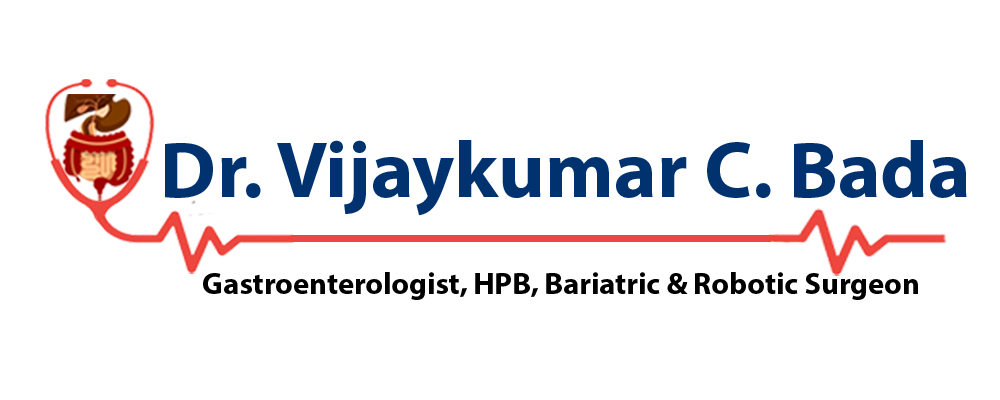Hernia Surgery
What is Hernia Surgery?
Hernia surgery is a general medical procedure used to treat a hernia. Not all hernias are the same and require different treatment methods and procedures. Over 20 million cases of hernia are evaluated worldwide throughout the year. But the good news is that hernia surgery is not complicated and can be accomplished with minimum invasive pain.
Treatment for a hernia typically involves surgery to repair the weak spot or tear in the muscle or tissue and prevent the hernia from recurring. Dr. Vijaykumar C. Bada offers successful methods to perform hernia surgery in Hyderabad.
What is Hernia?
A hernia is a medical condition that occurs when an organ or tissue bulges through a weak spot or tear in the muscle or connective tissue that usually holds it in place. Hernias can occur in different body parts, such as the abdomen, groin, upper thigh, or belly button. Hernia can be encountered as a bulge that may come and go in different positions and shows different activities.
What are the different types of Hernia?
Hernia is observed in different parts of the body and causes various symptoms. There are several different types of hernia, such as
Inguinal hernia: This is the most common type and is observed in the intestine. Inguinal hernia occurs when part of the intestine or fatty tissue protrudes through a weak spot in the lower abdominal wall near the inguinal canal.
Femoral hernia: Femoral hernia is caused when part of the intestine or fatty tissue protrudes through a weak spot in the upper thigh, just below the groin.
Umbilical hernia: Umbilical hernia occurs when part of the intestine or fatty tissue protrudes through a weak spot in the abdominal muscles near the belly button.
Incisional hernia: This type of hernia can occur at the site of a previous surgical incision or scar when part of the intestine or fatty tissue protrudes through a weakened abdominal wall area. Incisional hernia brings around 15-20% chances of abdominal hernia.
Hiatal hernia: This type occurs when part of the stomach protrudes into the chest through an opening in the diaphragm.
Epigastric hernia: Epigastric hernia occurs when fatty tissue protrudes through a weak spot in the abdominal muscles between the belly button and the lower part of the rib cage.
Spigelian hernia: This type of hernia occurs when part of the intestine or fatty tissue protrudes through a weak spot in the abdominal muscles along the edge of the rectus abdominis muscle, which runs vertically on either side of the midline of the abdomen.
What are the symptoms of a Hernia?
The symptoms of a hernia can vary depending on the type of hernia and its severity. However, common hernia symptoms include
- A visible or palpable bulge or lump in the affected area.
- Pain or discomfort in the affected area, especially when bending over, lifting heavy objects, or coughing.
- A feeling of heaviness or pressure in the affected area.
- Nausea, vomiting, or constipation in some cases.
- Inguinal hernias in men may cause pain or swelling in the scrotum or testicles.
- Hiatal hernias may cause heartburn, chest pain, and difficulty swallowing.
- Femoral hernias may cause pain and swelling in the upper thigh, just below the groin.
What are the causes of a hernia?
Various factors can cause various types of hernias. Some common and obvious factors that cause hernia are-
- Weakness in the abdominal wall.
- Heavy lifting or straining puts pressure on the abdominal wall.
- During pregnancy, when pressure is put on the abdomen, it can result in a hernia.
- Chronic cough or sneezing, such as asthma or allergies.
- Being overweight or obese can put extra pressure on the abdominal wall, developing a hernia.
- Previous abdominal surgery can weaken the abdominal wall muscles and increase the risk of developing a hernia at the incision site.
- Some congenital defects in the abdominal wall can cause a hernia from birth.
When is Hernia Surgery required?
Hernia surgery is typically recommended when a hernia causes significant symptoms, becomes larger over time, or poses a risk of complications. Some specific indications for hernia surgery include
- Severe pain or discomfort that affects daily activities.
- Enlargement of the hernia over time to become severe or cause complications.
- When a hernia becomes trapped and cannot be pushed back into place, it can lead to a potentially life-threatening condition called “strangulation.”
- Risk of bowel obstruction
- Cosmetic concerns to get rid of bulging part of the skin.
What are the available options for hernia surgery?
The different types of hernia require specific treatment based on their severity, location, and other factors. After all the examinations and required tests, Dr. Vijaykumar suggests you the best way possible for a hernia. These methods may involve both surgical and non-surgical methods. Being the best gastrointestinal surgeon, Dr. Vijakumar provides the best hernia surgery in Hyderabad. Some options for hernia surgery include
Open Hernia Repair: This is the traditional method of hernia surgery, where the surgeon makes an incision in the groin area, and the hernia is repaired using sutures, mesh, or both.
Laparoscopic Hernia Repair: This minimally invasive procedure involves making small incisions in the abdomen, and a laparoscope (a small, lighted tube with a camera) is inserted to repair the hernia with the use of mesh.
Robotic Hernia Repair: This type of laparoscopic surgery uses a robotic system to perform the surgery. The surgeon controls the robotic arms from a console, which provides greater precision and control than traditional laparoscopic surgery.
Tension-Free Hernia Repair: This technique uses a mesh patch to cover the hernia, and the mesh is held in place by sutures or staples without any tension.
Mesh Plug and Patch Repair: This technique uses a mesh plug inserted into the hernia defect and then covered by a larger mesh patch.
Are there complications of Hernia Surgery?
Yes, like any surgery, hernia surgery can have complications. However, the risk of complications is generally low, and most people recover without serious problems. Some possible complications of hernia surgery include infection and chronic pain that can be cured with some antibiotics prescriptions. Sometimes, the person may face bleeding from the operated area that needs extra care.
In rare cases, hernia surgery may cause a bowel obstruction requiring emergency treatment.
How to manage pain after Hernia Surgery?
Many people make queries during the time of consultation if the pain after hernia surgery is normal or need to pay extra attention to it. Being the best Hernia surgeon in Hyderabad, Dr. Vijaykumar listens to all your queries and concerns about hernia surgery. Remember that everyone’s recovery process is different, and the pain management and recovery process can vary. Here are some tips on how to manage the pain after hernia surgery.
Take pain medication as prescribed: Your surgeon will prescribe pain medication to help manage the pain after surgery. Make sure to take it as directed, and do not skip any doses. You must contact your surgeon if the medication does not relieve pain.
Apply ice packs: Applying ice packs to the affected area can help reduce swelling and relieve pain. Place an ice pack on the incision site for 20 minutes several times daily.
Rest and relax: Resting and avoiding strenuous activity can help reduce pain and speed up healing. Try to avoid any activity that puts strain on the incision site.
Eat healthy: A healthy diet can help promote healing and reduce inflammation. Focus on eating a balanced diet with plenty of fruits, vegetables, lean protein, and whole grains.
Stay hydrated: Drinking plenty of water can help flush out toxins from your body and promote healing.
Use a heating pad: After a few days of using ice packs, you can switch to a heating pad on the incision site. This can help promote blood flow and relieve pain.
Follow your surgeon’s instructions: Follow all instructions provided by your surgeon, including any post-surgery care and exercise recommendations.
What are the benefits of Hernia Surgery?
Hernia surgery can provide significant benefits for individuals suffering from a hernia. Here are some of the benefits of hernia surgery:
- It Relieves symptoms like continuous pain, swelling, and discomfort in performing daily activities.
- Prevents complications and serious health issues and improves the quality of life.
- It takes a short recovery time, and you can resume your daily activities within a few weeks of surgery.
- After the hernia surgery, there is a low recurrence rate, meaning that the hernia is unlikely to return after surgery.
How to best deal with Hernia?
Hernia surgery can significantly improve your daily lifestyle and quality of life. It is important to consider the symptoms and speak to your healthcare provider. With over 20 years of experience, Dr. Vijaykumar provides the best care and hernia surgery in Hyderabad. Anyone looking for information regarding hernia and what treatment options are available for hernia can easily connect with Dr. Vijaykumar over a quick call. Just ring +91 9000888605.
Stay Connected with
Dr. Vijaykumar C. Bada

Dr. Vijaykumar C. Bada is the best Gastroenterologist in Hyderabad city of Telangana.
- Flexible Appointments & Urgent Care
Dr. Vijaykumar C. Gastroenterologist
Design & Developed by Pointofviewer
Copyright © 2021. All rights reserved.
